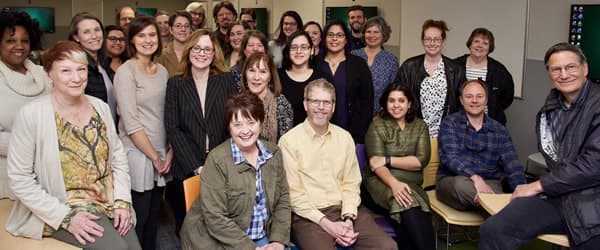
The University Writing Program (UWP) has implemented a number of curriculum, assessment and other innovations that have resulted in national recognition from the Conference on College Composition and Communication (CCCC). The University was one of nine institutions to receive the conference’s Writing Program Certificate of Excellence.
“This award pays tribute to the University Writing Program faculty who have spent six years building an independent program through curricular research and design, and through the revision of student learning outcomes and assessments designed to inform how we teach writing,” said Joan Mullin, University Writing Program executive director and professor of English. UWP, which serves the entire University, is housed in the College of Liberal Arts & Sciences.
She added, “While our faculty have worked to transform the University Writing Program, we could not have done so without the collaboration and support of the offices of the Provost, Academic Affairs Assessment and the Dean of the College of Liberal Arts & Sciences and many others across the University. We are honored to receive this national acknowledgement of our labor and our institution’s support of student writing.”
The CCCC selection committee commended the University Writing Program team for collaborating to bring about positive change, including revamping the first-year writing curriculum to better reflect best practices in the field. The program is employing a social constructivist approach, which emphasizes how knowledge is constructed through interaction with others and how audience expectations can shift from context to context. The program also has implemented a number of measures, both short- and long-term, to assess the effectiveness of the program.
The committee also remarked upon curriculum innovations that keep First-Year Writing “lively and alive.” Committee members cited the move to a one-semester first-year writing requirement and a second sophomore-level course taught by faculty across campus. Writing program faculty and faculty campus-wide have started exchanging vocabularies and pedagogies in an effort to support “writing transfer.”
“Students tend to silo their courses rather than draw connections between the varied concepts and writing expectations across disciplines,” Mullin said. “Teaching for transfer builds a bridge from students’ experiences, asking them to remix or integrate their previous knowledge, strategies and skills instead of approaching each writing assignment like a totally new task, or worse, writing a lab report like a personal narrative.”
The award selection committee also acknowledged the University Writing Program’s efforts to support UNC Charlotte’s diverse student population through dedicated sections so international/multilingual students and domestic/monolingual students focus on global issues together. The committee noted that the program’s outreach efforts such as through the Veterans Writing Group could offer an effective model for other institutions.
The judges pointed out another strength was a stated commitment to equity, coupled with concrete actions that include the completion of Safe Zone diversity training for more than 50 percent of the program’s faculty, and faculty and staff participation on the University Diversity Committee.
The College Composition and Communication is a constituent organization within the National Council of Teachers of English. UNC Charlotte received this national honor at the CCCC annual convention in Kansas City, Missouri.
Read the entire story on the CLAS Exchange website.
Photo (by Lynn Roberson): Faculty in the University Writing Program gather at a recent team meeting.